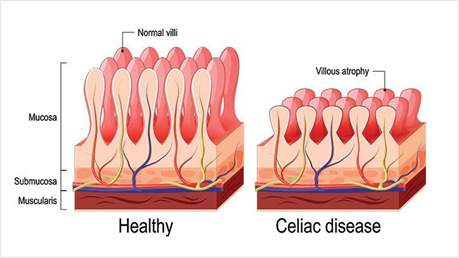Current state in celiac research; Disease affects 1% of population

Pictured above is an example of the villi in the small intestine, they absorb and spread the nutrients you ate throughout the body. Compared to someone with Celiac Disease, they are cut shorter which means the person gets little to no nutrients.
March 9, 2023
Many people don’t know about this disease that affects at least 3 million citizens in the U.S. However, what’s more disturbing, is that more than 60% of these people are not even aware that they have this illness and ignorance can lead to harmful disasters in the body.
Symptoms of Celiac include fatigue, diarrhea, weight loss, bloating, abdominal pain, nausea/vomiting, and constipation. People also usually display warning signs through “unrelated” symptoms such as anemia, osteoporosis, itchy/blistery skin, mouth ulcers, migraines, cognitive impairment, joint pain, and reduced function of the spleen. [Information according to mayoclinic.org]
Junior Abby Averella has celiac disease and claims that a big way it has affected her life is “when I was a kid and I would go over to my friend’s house I would hate being such an inconvenience about eating dinner. Also even now, finding decent baked goods especially or gluten-free food in general that doesn’t fall apart in your hands is really difficult.”
There is no cure for the ailment other than avoiding all food that contains gluten, although attempting this diet is in no way cost effective nor is it easy. It is almost impossible to successfully continue a gluten-free diet 100% of the time, because of cross-contamination in factories, poorly written food labels, and uncooperative restaurants.
Researchers use biopsies from willing patients’ small intestines in order to conduct experiments in search of a cure. This usually is not a separate procedure, but these samples are taken after the testing of patients to see if they even have the disease.
While there isn’t one yet there have been many helpful studies that provided useful information. According to beyondceliac.org, having Celiac can increase the possibility of developing heart disease compared to those who don’t. This fact is a bit out of the norm because those with Celiac are less likely to obtain many risk factors of heart disease such as being overweight, having high blood pressure, and high cholesterol but this does not rule these people out of heart problems.
Also according to celiac.org, a clinical trial from Nov. 2021 showed that a certain drug-ZED1227 has “successfully reduced gluten-induced duodenal mucosal damage in people with celiac disease.” Dr. Joseph Murray, CDF Medical Advisory Board Member found that the drug is “encouraging though cautious.” More studies will need to be conducted in order to confirm the efficiency and functionality it has in combating symptoms and damage in patients. The foundation claims they believe the drug “could be essential to improving the health and quality of life of those with celiac disease.”










